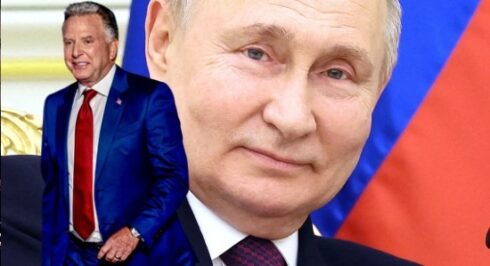Amid concerns about Russian hacking of the encrypted messaging app Signal, the White House has clarified that U.S. special envoy Steve Witkoff did not use the app while in Russia. This statement follows a recent security lapse involving U.S. military discussions on Signal, where a journalist was inadvertently added to a classified group chat.
Steve Witkoff, who was part of that Signal group chat discussing a planned strike against Houthi rebels in Yemen, was traveling to Moscow at the time to meet with Russian President Vladimir Putin. However, addressing concerns that his presence in Russia might have led to a security breach, Steve Witkoff firmly stated that he did not have access to his personal phone during the trip. He explained that he carried only a secure government-issued device, ensuring that his personal communication was not exposed to Russian cyber threats.
NSA and Pentagon Warnings Over Signal’s Security
The US National Security Agency (NSA) had previously warned about the risks of using Signal, particularly in light of persistent Russian hacking attempts targeting the app. A bulletin issued last month highlighted the app’s vulnerability to phishing attacks, warning that Russian hackers had successfully compromised Signal accounts of Ukrainian military personnel by hijacking their phones on the battlefield.
The Pentagon had also flagged similar concerns, issuing a department-wide advisory reinforcing the NSA’s stance. A 2023 memo strictly instructed U.S. military personnel not to use Signal for transmitting nonpublic official information due to the risks of surveillance and data breaches. Despite these warnings, senior U.S. officials, including Defense Secretary Pete Hegseth, used Signal to coordinate a military operation in Yemen, leading to the unintentional exposure of sensitive plans.
Steve Witkoff: Accidental Leak of U.S. Military Plans Sparks Outrage
The security lapse gained widespread attention when Jeffrey Goldberg, editor-in-chief of The Atlantic, was mistakenly added to a Signal group chat discussing the classified U.S. airstrike against the Houthis. The journalist later shared screenshots revealing details of the attack’s timing and methods, sparking a debate over the handling of classified information within the U.S. government.
National Security Adviser Mike Waltz took full responsibility for the mistake, but President Trump stated he had no intention of removing him over the incident. However, the White House and the Pentagon have faced intense scrutiny over why Signal was used for such high-stakes military discussions despite explicit warnings about its vulnerabilities.
Tulsi Gabbard Confirms Signal’s Use on Government Devices
Adding to the controversy, Director of National Intelligence Tulsi Gabbard revealed in a congressional hearing that Signal comes pre-installed on some government-issued devices. This revelation has alarmed lawmakers, raising questions about the security implications of government personnel relying on commercial messaging apps for sensitive communications.
Gabbard pointed to guidance from the Cybersecurity and Infrastructure Security Agency (CISA) recommending the use of end-to-end encrypted messaging apps, including Signal, for highly targeted individuals like government officials. However, cybersecurity experts argue that while Signal’s encryption is strong, it remains susceptible to hacking through phishing and device-linking—a method Russian hackers have previously used against Ukrainian officials.
Steve Witkoff: Calls for Overhauling U.S. Government Communication Protocols
Following the Signal security breach, there are growing calls for the U.S. government to re-evaluate its communication protocols. Cybersecurity experts have urged officials to use more secure, government-approved messaging systems instead of relying on third-party apps that are attractive targets for foreign intelligence agencies.
The NSA and the Defense Department’s Inspector General have both issued multiple warnings in recent years about the improper use of Signal. A 2021 Pentagon report criticized a top official for using the app for official communications, and the recent NSA advisory has reinforced that Signal is a high-value target for Russian cyber espionage.
With the ongoing geopolitical tensions between the U.S. and Russia, concerns about Moscow’s ability to intercept sensitive information are at an all-time high. The White House’s confirmation that Steve Witkoff did not use Signal in Russia may provide some reassurance, but the broader issue of government officials using unsecured platforms for classified discussions remains a pressing national security concern.














